Classic Commentaries and Studies on the Pastoral Epistles (12 vols.)
Digital Logos Edition
Overview
The Classic Commentaries and Studies on the Pastoral Epistles offers some of the most significant classic studies on the Pastoral Epistles from the late-nineteenth and early-twentieth-centuries. With notable authors such as Patrick Fairburn, H. P. Liddon, and R. F. Horton, Classic Commentaries and Studies on the Pastoral Epistles offers over 2,000 pages of interpretation, observations, translations, contextual history, and practical application. The 12 volumes contained in the Classic Commentaries and Studies on the Pastoral Epistles have had an enduring impact on New Testament exegesis, and this exceptional collection provides easy accessibility to this wealth of significant scholarship.
This collection is essential for students, scholars, pastors, historians, teachers of the Bible, or anyone studying the Pastoral Epistles. With Logos Bible Software, this collection is completely searchable, with passages of Scripture appearing on mouseover, as well as being linked to the Greek and Latin texts and English translations in your library. This makes these texts more powerful and easier to access than ever before for scholarly work or personal Bible study. With the advanced search features of Logos Bible Software, you can perform powerful searches by topic or Scripture reference—finding, for example, every mention of “apostle,” or “Titus 2:1.”
Build your library with the Classic Commentaries and Studies on the Pastoral Epistles Upgrade.

- Contains work from notable authors from a variety of backgrounds
- Includes almost 3,000 pages of notable scholarship on the Pastoral Epistles
- Provides materials that are completely searchable and linked to your preferred Bible translation and other books in your library
- Title: Classic Commentaries and Studies on the Pastoral Epistles
- Volumes: 12
- Pages: 2,351
This title is included in the following collections
You can save when you purchase this product as part of a collection.
Logos 8 Collector's Edition Le...
$11,399.99$11,399.99Logos 9 Collector's Edition Le...
$11,399.99$11,399.99Logos 8 Ultimate Legacy Librar...
$21,749.99$21,749.99Logos 9 Ultimate Legacy Librar...
$24,999.99$24,999.99
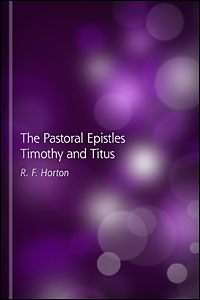
Examining the authenticity, authorship, and structure of the Pastoral Epistles in relationship to each other, R. F. Horton offers concise studies on the text.
The notes of this volume are exceedingly helpful to a right understanding of the text . . .
—British Books
R. F. Horton (1855–1934) was educated at New College, Oxford before becoming a fellow of theology. Horton is the author of many titles including The Book of Proverbs, The Bible: A Missionary Book, A History of the Romans, and The Trinity.
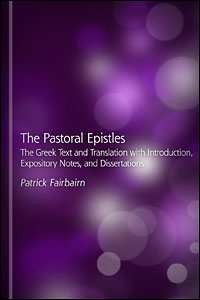
Offering extensive commentary on the text, Patrick Fairbairn exegetically examines authorship, clarity of translation, and semantic expression within the Pastoral Epistles. Providing explanatory notes that offer clarification and exposition of the text, Fairbairn moves verse-by-verse through the text.
The exposition is throughout scholarly and careful, devout in tone, and admirable for its application of the apostle’s teaching to the conscience and understanding of Christian ministers in our day. We give it our warmest recommendation.
—The London Quarterly Review
Patrick Fairbairn (1805–1874) was educated at the University of Edinburgh before becoming professor of theology at Free Church Theological College. Fairburn later became professor of church history and exegesis at the Free Church College in Glasgow.
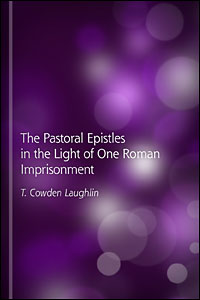
Examining authorship, composition, and structure of the Pastoral Epistles, Thomas Cowden Laughlin critically examines the variation between the books in relevance of Paul’s imprisonment.
Thomas Cowden Laughlin, born in 1857, was educated at Princeton and Harvard before becoming chair of New Testament language and literature at Pacific Theological Seminary.
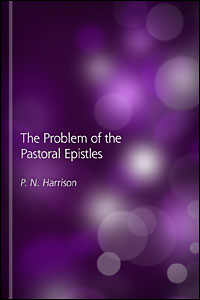
Examining the semantic, doctrinal, and historical context found in the Pastoral Epistles, P. N. Harrison offers concise commentary on the text. Diligently studying the progression of church doctrine, Harrison acquaints the audience to the development of the early church.
P. N. Harrison was minister of Salisbury Congregational Church in Salisbury, England.
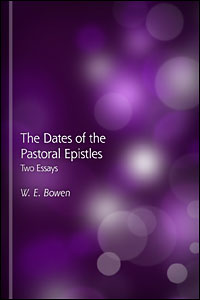
Taken from the original essays written by W. E. Bowen, this commentary offers exegetical analysis of the chronological authorship of the Pastoral Epistles. Attributed to Paul’s authorship throughout the duration of his imprisonments, Bowen expounds on the variation in stylistic writing.
W. E. Bowen, born in 1862, was educated at Balliol College, Oxford before becoming vicar of St. Mars, Nottingham.
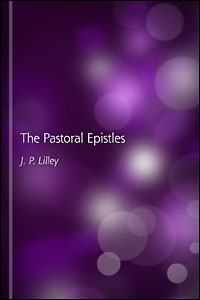
In The Pastoral Epistles, J. P. Lilley compares the aggregate scholarship of the Pastoral Epistles to the individual authorship and style of each individual book. Discoursing on the unique character and purpose of each book, Lilley provides comprehensive studies on the text.
Mr. Lilely’s volume on the Pastoral Epistles forms one of the excellent series of handbooks intended for theological students, and is a valuable and careful contribution.
—The Critical Review of Theological and Philosophical Literature
J. P. Lilley was fellow of New College, Edinburgh.
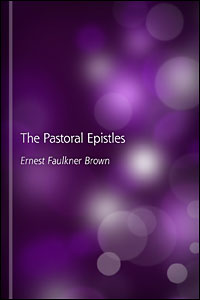
The Pastoral Epistles provides exegetical commentary on the Pastoral Epistles—namely the books of Timothy and Titus—Ernest Faulkner Brown succinctly studies the authorship, credibility, and scope of the text.
Ernest Faulkner Brown was educated at Trinity College and Oxford University before becoming a missionary to Kolkata, India. Brown’s published works include From Nature to Christ and Epistle to the Hebrews.
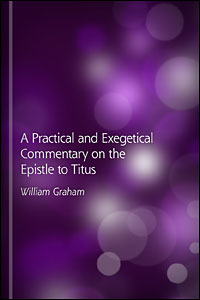
Expounding on the principles and doctrines provided by the Epistle to Titus, William Graham offers succinct commentary concerning authorship, authenticity of the text, and inherent meaning. Graham provides elucidation of the text through interlinear translation and annotation, as well as critical semantic interpretation.
The commentary is more readable that works of the same nature. It is one of those works . . . that readers interested in this class of literature will probably secure.
—Tait’s Edinburgh Magazine
William Graham (1823–1887) was educated at the University of Glasgow before being ordained in 1846. Graham later became the pastor of Presbyterian Church College until 1880. He became professor of church history at Presbyterian Church College, London from 1880–1887.
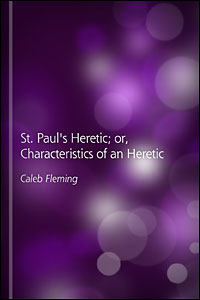
Focusing on the text of Titus 3:10, Caleb Fleming expounds the historical context surrounding the work of St. Paul. Examining the effects of heretics on the early church, Fleming provides succinct commentary on the moral sentiments at that time.
Caleb Fleming (1698–1779) was a tutor at Warrington Academy and pastor at the Presbyterian Church in Workingham, Berkshire. Ordained in 1740, Fleming led a life of ministry throughout London. Fleming is the author of many works including The Challenge on Baptism, Natural and Revealed Religion at Variance, Grammatical Observations on the English Language, and An Appeal to the People of England.
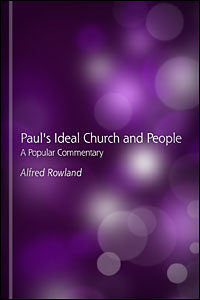
Discoursing on the authoritative nature of Paul’s conversion, the scope of his missionary work, and the responsibilities of the church, Alfred Rowland offers comprehensive commentary on the Pastoral Epistles.
With this interpretation of the author we fully agree, and find the book in other respects . . . a treasure of spiritual and helpful instruction.
—Methodist Review
Alfred Rowland (1840–1925) was chair of The Congregational Union of England and Wales, as well as the pastor of the Congregational Church in Frome.
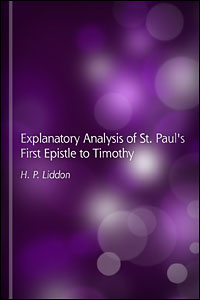
Intended for use by seminary students, H. P. Liddon’s Explanatory Analysis of St. Paul’s Epistle to Timothy offers concise exposition of the text with regard for practical application. Emphasizing the standard of morality for clergy and the body of Christ, Liddon elucidates the intended meaning of the text through semantic interpretation.
It is a form of work which is to be commended to students, and nothing could be more inspiring in this kind of work than such a model as this.
—The Independent
H. P. Liddon was one of the nineteenth century’s most influential theologians. Born in England in 1829, he studied at King’s College and Oxford, then became canon of St. Paul’s Cathedral in London, where thousands listened to him preach every Sunday. Accepting the position of professor of the exegesis of holy Scripture at Oxford, he taught there until retirement, at which time he traveled extensively, on occasion with his good friend Lewis Carroll. Liddon died in 1890.
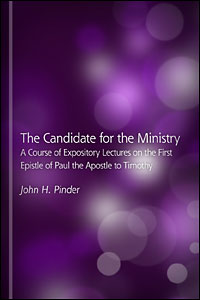
Originally delivered as lectures to Codrington College, John H. Pinder offers examination of key traits and characteristics for effective ministry. Pinder highlights critical aspects of character that are displayed by Paul throughout his ministry.
John H. Pinder was curate of St. Mary Lambeth and principal of Codrington College.
Reviews
6 ratings
Millie Martinez
5/8/2020

Claybon Collins Jr
5/29/2018

M. David Johnson
3/27/2015

Larry Proffitt (I
11/13/2013

Caleb Allen
10/12/2013
Eduardo Vega
9/25/2013